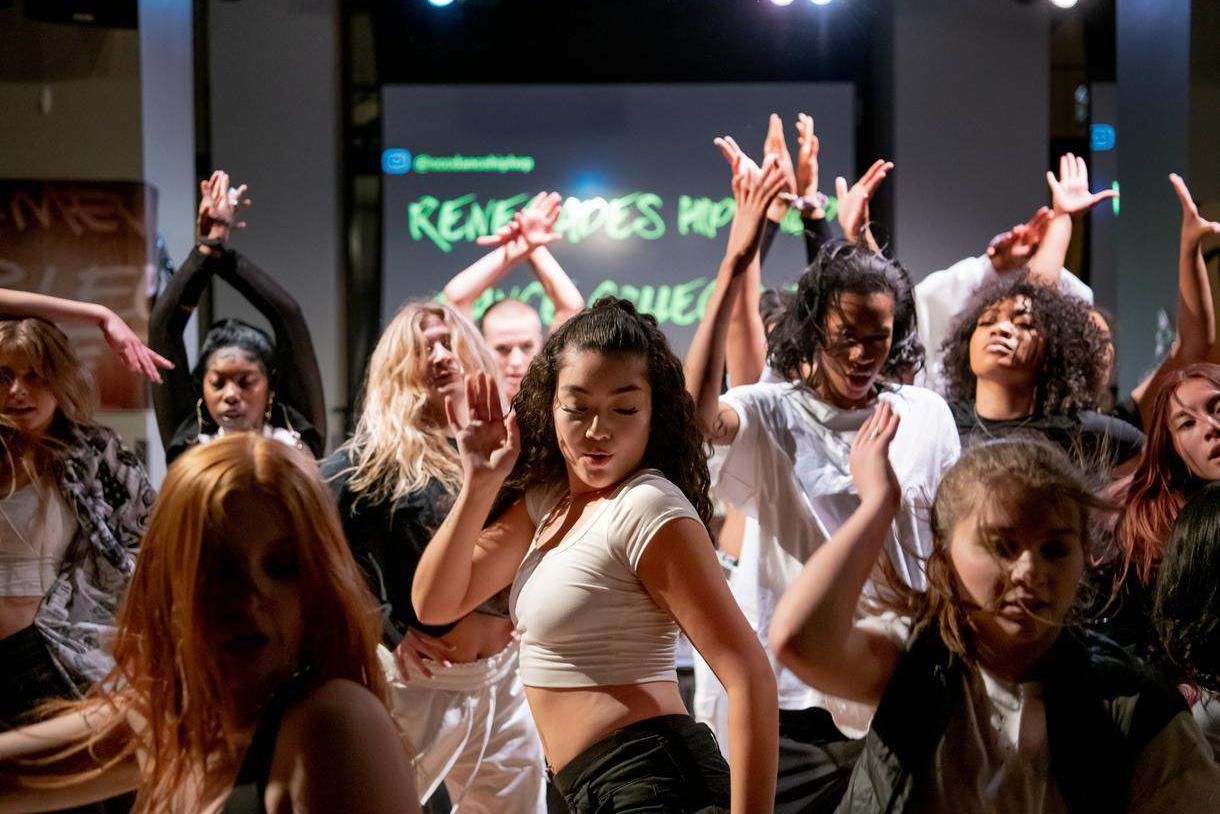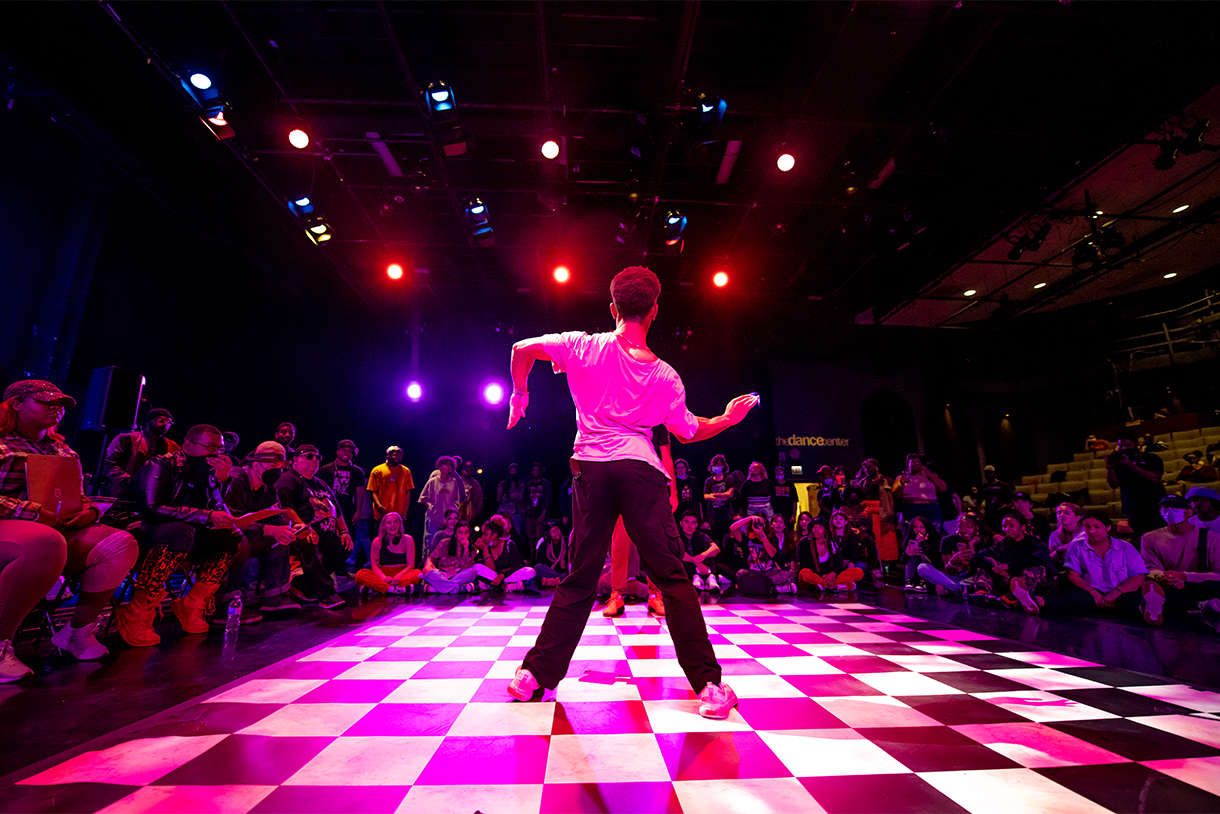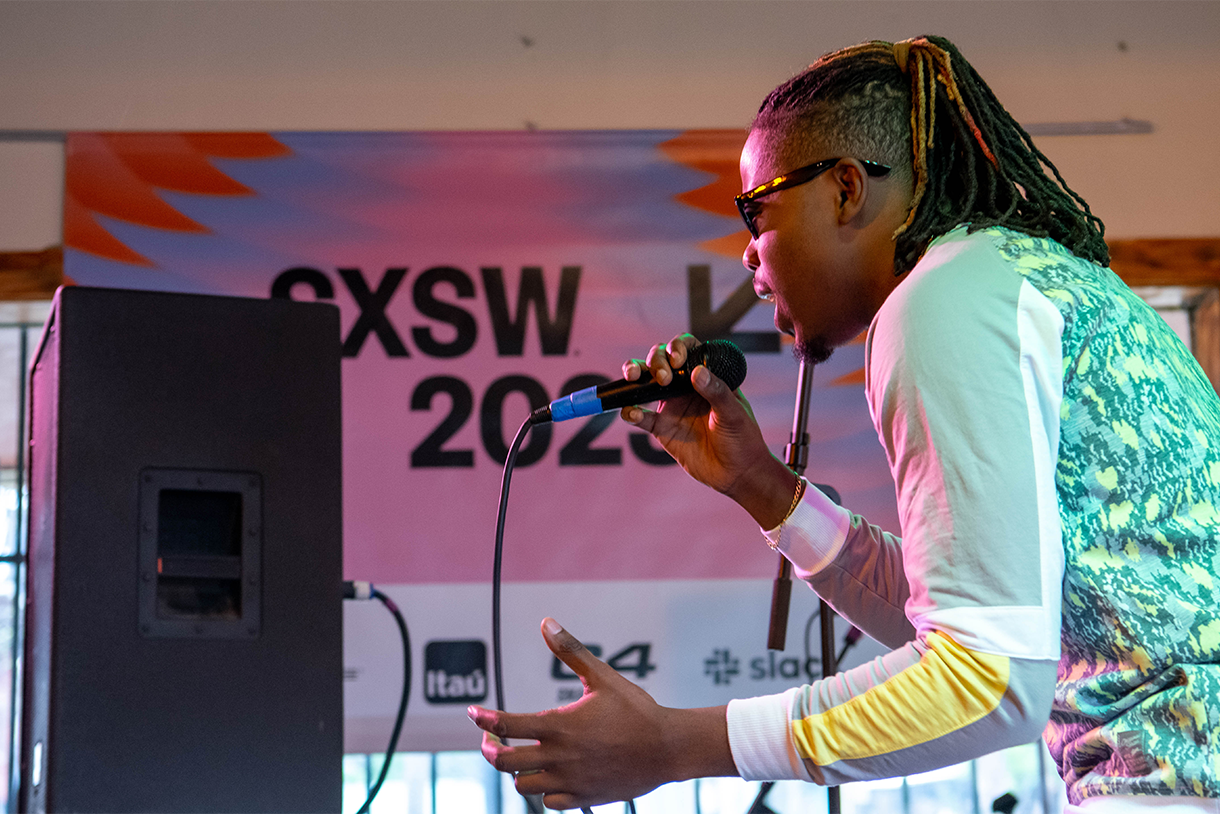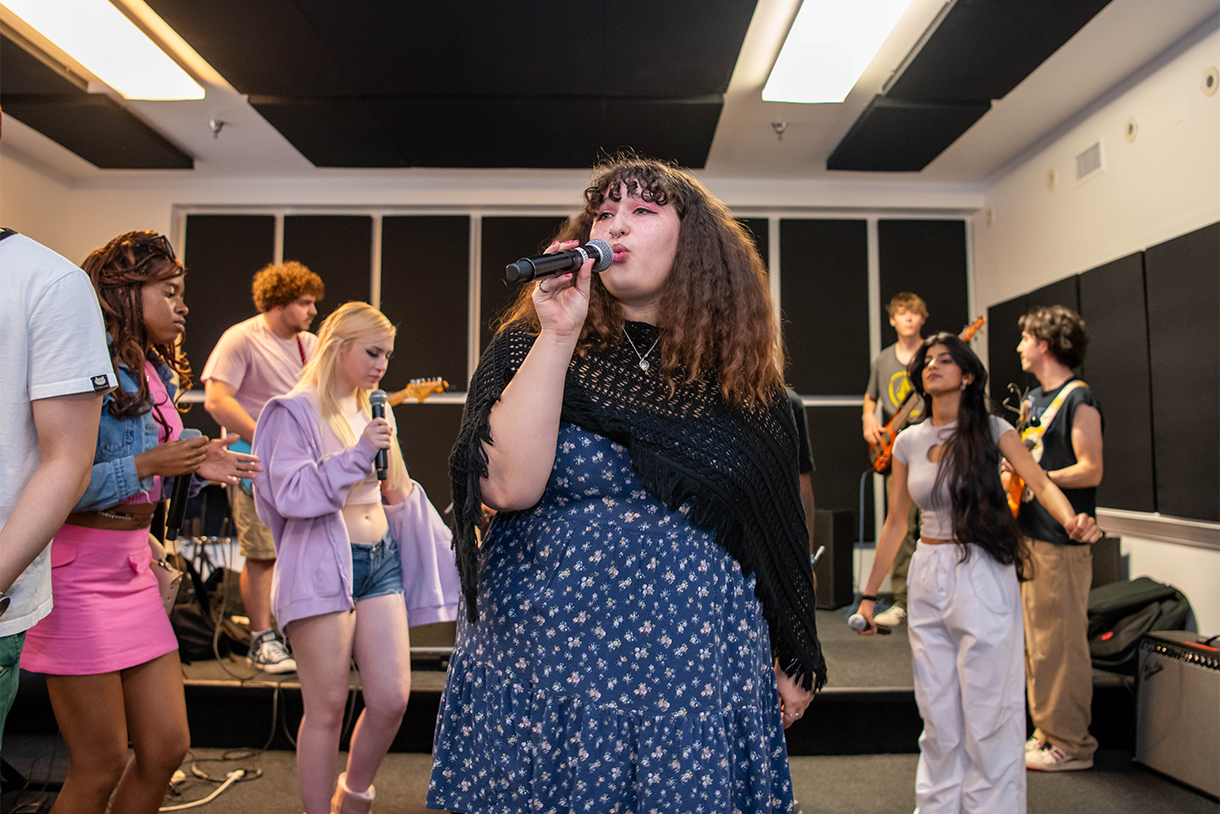Integrating Hip Hop Into the Student Experience
This year marks the 50th anniversary of hip hop. And for Columbia College Chicago — home to a Hip-Hop Studies minor, hip hop performances and exhibitions, and many hip-hop artists — that’s cause for reflection on this cultural movement and how it has been woven into the fabric of Columbia. Because, like Columbia, hip hop touches on everything from music and dance to fashion and art to design and business.
“The influence of hip hop on the world is simply immeasurable,” says Amina Norman-Hawkins, a Music adjunct faculty member at Columbia College Chicago and an emcee/rapper and co-founder of Chicago Hip-Hop Heritage Month.
Creating Channels for Commentary and Celebration
Since its early beginnings in the South Bronx of New York City during the 1970s, hip hop has evolved from its association to DJing to include breaking (aka, b-boying and b-girling), emceeing, and graffiti art. These platforms all provide communal channels for the commentary, self-expression, and calls for social justice that are hallmarks of hip hop.

“Hip-Hop has been called ‘a collective consciousness’ and it really is. It’s greater than the music, lyricism, and fashion. Those are the attributes often seen by the public, but what resonates most with me is hip hop’s strong sense of community and camaraderie and its unapologetic approach to activism,” Norman-Hawkins says.
“Even more impressive is how Black and brown kids created something out of absolutely nothing that has touched nearly every aspect of our world.”
Hip-Hop Studies Minor Mirrors the Culture
Recognizing hip hop’s importance and its many creative touchpoints, Columbia welcomed the first students to its interdisciplinary Hip-Hop Studies minor in 2017. “The major was created so students could dive deeper into hip hop and get a well-rounded experience that mirrors the culture of hip hop,” says Kelsa Rieger-Haywood, an associate professor in Dance.

As a school for creatives that embraces artistic diversity, the interdisciplinary minor fit perfectly into the curriculum and has proven popular with students.
“Hip-hop culture incorporates music, dance, fashion, graphic design, photography, performance, and every other artistic discipline we have at the college,” Norman-Hawkins says. “It's the perfect place for such a program.”
It’s a minor that runs deep, according to Daniel "BRAVEMONK" Haywood, adjunct faculty member, dancer, and choreographer. “There's space for collaboration between disciplines, which is going to happen in the real world,” he says.
According to Haywood, the curriculum also highlights important work that often gets missed.
“We get a chance to recognize the contributions of Black and brown folks. And that’s largely been othered in institutions,” Haywood says. “And here at Columbia, we are more and more bringing it to the center, bringing in the right practitioners and people who have this lived and embodied experience.”
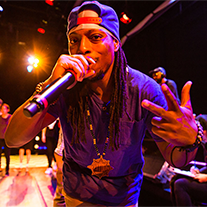
Nathan Brown, a Music Business major and Hip-Hop Studies minor, belongs to Columbia’s Hip Hop Club (see below) and appreciates the opportunities he’s had at Columbia.
“It's truly been an honor learning from and about Columbia's legendary hip hop alumni from people like Chris Hawkins (aka Coolout Chris) and Stef Skills who offer their knowledge, stories, and resources so kindly to students,” Brown says. “There are people like the late Parker Lee Williams '90, who had such a huge impact on not just Columbia's hip hop scene, but Chicago's music scene as a whole…Learning about people like him not only inspires me and many other Columbia students but it shows us almost a blueprint of how we should be building up our communities.”
Hip Hop Inside and Outside the Classroom
Hip hop education, and all it encompasses, can be found both inside and outside the classroom at Columbia.
For dance students, who are required to take hip hop, there’s a deep commitment to connect students to the culture and communities of hip hop outside the classroom.
“We build with local Chicago artists and put students in real-world scenarios with the culture/community. In most hip-hop/street dance classes, students are required to attend outside community events,” says Rieger-Haywood.
In fact, the desire to provide a space on campus where students can engage with the culture authentically is what led to the creation of the B-Series, according to Kelsa Rieger-Haywood. The B-Series, which is co-curated by Rieger-Haywood and Haywood— is an annual festival that centers around a big jam, or dance-party, with head-to-head dance battles involving Columbia students and some of the top hip-hop/street dancers in the region. The Dance department also participates in two other annual events that celebrate hip hop: The Fresh Connect and ManiFresh, both of which are organized students in Business and Entrepreneurship’s Events Management Practicum — a course that is part of the hip-hop minor.
The Music department is home to Columbia’s Hip-Hop Ensemble, which takes what it learns in the classroom and brings it to the performance stage. This group includes a live band, singers, and MCs, with members contributing as writers and performers. The group draws music from across hip-hop history, including the work of such artists as The Roots, Kendrick Lamar, Common, A Tribe Called Quest, and other hip-hop legends.
Students also get real-world experiences as they learn about the business side of the hip-hop industry. AEMMP Records, part of Columbia’s Business and Entrepreneurship department, is a student-run record label that focuses on recording and promoting hip hop artists and has its own hip-hop division. Some of these artists can be seen when Columbia students travel to SXSW in Austin, Texas, on behalf of Columbia’s AEMMP Records. There, students put on a musical showcase featuring hip-hop artists — often Columbia students and alums themselves.
Streetwear Designers Find What They Need at Columbia
In addition to those aspiring to enter the music industry, Columbia’s Business and Entrepreneurship program also attracts many Fashion Studies students who already have their own streetwear lines, says Colbey Reid, chair of Fashion Studies. “They use Fashion Studies classes and those offered in the Business and Entrepreneurship program to refine their entrepreneurship models.”
Last year Fashion Studies, students found a streetwear focus in the Trendspotting class, taught by Jacob Victorine, practitioner in residence and the founder/designer of All We Remember, responsibly made, gender-neutral clothing line.

“Hip hop has influenced fashion to such a substantial and vast extent that it would be quicker and easier to name the ways in which it hasn’t influenced fashion,” Victorine says. “From the early days of b-boy and b-girl-driven sneaker culture to Dapper Dan’s ‘logomania’ that spawned all-over-logo prints, hip hop has driven fashion and national and international culture since not long after DJ Kool Herc rocked the party at 1520 Sedgwick Ave in 1973,” Victorine says. as he points to all the fashion trends borne out of hip hop.
Students Bringing Hip-Hop Culture to Campus
As hip hop is a shared interest of many Columbia students, it should be no surprise that Columbia students run clubs devoted to hip hop.
The Hip-Hop Club hosts events, workshops, and performances to foster a sense of community and appreciation for the elements of hip hop. Just recently, the club welcomed two Columbia alums and well-known graffiti artists to a student workshop, artists and alums BBoyB '94 and Stephanie Garland ‘11 (aka Stef Skills). Both artists have worked on projects with Columbia in the past (see videos in sidebar).

“The club has allowed me to connect with like-minded individuals who share a profound appreciation for hip hop culture. Through events, discussions, and workshops, I've gained a deeper understanding of the history, artistry, and social impact of hip hop,” say I’Ja Wright, a junior who is the club’s president and is a Marketing major.
For Junior CJ Young, a Music Business major with a minor in Creative Writing and an artist in his own right, the club has strengthened his connection to Chicago hip hop. “I had the privilege to meet and collaborate with some of the originators of Chicago Hip Hop plus had the honor to meet the owners of the Chicago Hip Hop Heritage Museum,” he says.
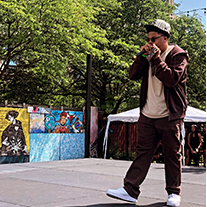
While the Hip Hop Club takes a wider view of hip hop, the Renegades Hip Hop Dance Crew focuses on hip hop dance as a form of liberation and expression. Their goal: to spread the four principles of hip hop through dance: peace, love, unity, and having fun.
Happy 50th … Now What?
Columbia students, faculty, and staff will continue the work of creating, learning, performing, and coming together via hip hop long after the 50th anniversary ends. That said, the anniversary has brought validation, meaning, and hope to many, including Haywood.
“This anniversary says to me that, even when you thought this was a fad, we are still here in your face,” he says. “But it also says to me, what do I want the next 50 years to look like? What do I even want the next year to look like? That starts today. That starts now, and that starts with you. It starts with me. That starts with us. And so I am very much interested in cultivating a holistic nurturing of hip hop and humanity. That is what is at the core of hip hop.”
MEDIA INQUIRIES
Jill Goldberg
Communications Manager
jgoldberg@colum.edu
Check out these videos about Columbia and hip hop:
- Alum BBoyB '94 talks about graffiti, his relationship to hip hop, and working with Columbia College Chicago students. (Video was shot and edited by Ryan Brockmeier, the director of the upcoming documentary film "Midway: The Story of Chicago Hip-Hop.")
- Alum Stef Stills '11 worked with Columbia on a mural at Columbia’s Student Center. Learn more about the project.
- In 2018, we asked the question “How do you define Chicago Hip Hop?” This is what we learned from the Columbia community.
Recent News
- Alum Patricia Kara’s New Book Offers Behind-The-Scenes Look at the Entertainment World
- Grace Kessler Overbeke to Present The Many Mrs Maisels 20th Century US Jewish Female StandUp Comedians
- ASL Conference Brings High School and College Students Together at Columbia College Chicago
- What to Watch and Where to Wander This Winter: Columbia Edition
- Five Columbia Students Earn Prestigious Fashion Scholarships
